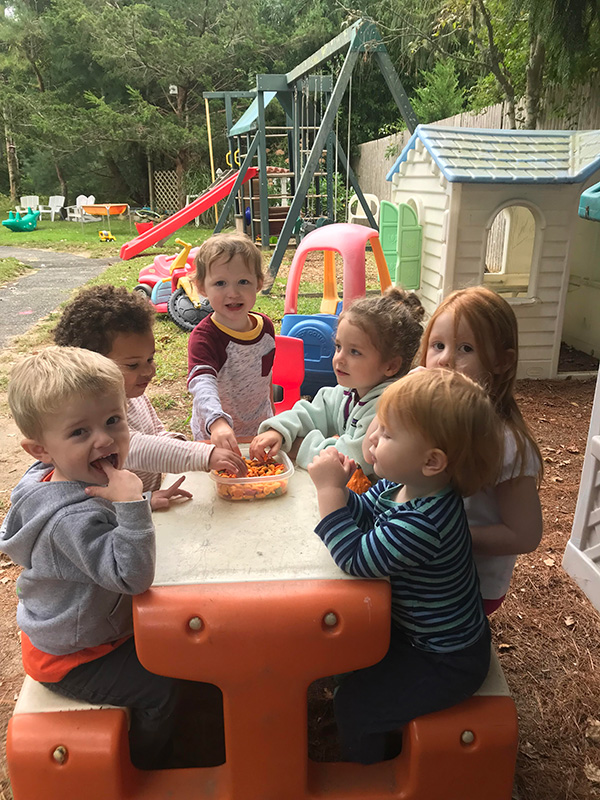Martha’s Vineyard, an island south of Cape Cod, Mass., has long been known as a resort community for prosperous Black families as well as a gathering place for Democratic Party leaders and supporters. There’s more to the picture, however, than summertime wealth and power. A recent report based on the American Communities Survey described “a continuing housing crisis and some of the deeply ingrained inequality affecting the rest of the country.”
The Vineyard’s year-round population, which largely comprises tradespeople and service industry workers, does not lead a glamorous lifestyle, explains Joanne Lambert, a longtime early child educator on the Vineyard. “Simple geography limits our resources,” she says, especially with regards to affordable housing. A community needs assessment in 2018 also revealed high-quality child care to be a “significant concern.”
“It’s called family child care for a reason,” says Lambert, who is leading an effort to increase the quantity and quality of home-based programs on the Vineyard. Recipient of a Martha’s Vineyard Vision Fellowship to promote sustainable island living as well as a 2021 Family Child Care (FCC) Innovation Networks Award from the Saul Zaentz Early Education Initiative, she provides mentoring and professional development for Martha’s Vineyard’s community of educators.
“The Zaentz FCC Innovation Networks Award was designed to highlight and strengthen precisely this type of provider-led peer learning work,” says Zaentz Initiative co-director Nonie Lesaux. “FCC programs have so many strengths and play a pivotal role in our diverse communities nationwide. As we think about the pandemic recovery, FCCs are crucial; they are set up to serve small, mixed-age groups of children, and they are often more flexible than other care types. Yet FCC educators tend to lack the support and professional networks that are available in other early education settings. We are thrilled to be able to support educators like Joanne, who are leading meaningful, innovative work that will benefit their colleagues as well as the children and families they serve.”

Lambert notes that on the Vineyard, as is the case around the country, the pandemic has opened people’s eyes to the importance of reliable, high-quality child care to the functioning of the economy. In addition to the mere fact of having someone to look after the children, the benefits of getting them ready for school are proven in study after study. Kindergarten teachers report that the children who’ve been through FCC are more developed in their social skills than those who did not.
FCC, Lambert explains, often makes sense for children who are too young for a child care center or who aren’t going to thrive in a center. “They get individual attention,” she says. “We really get to know those kids.”
After 30-plus years as an early childhood educator and business owner on Martha’s Vineyard, leading the network has meant a new stage in Lambert’s career. “I found a career I loved,” she says. “Now it’s my turn to spread the word and, hopefully, to build up the supply to come closer to meeting the demand.”
The opportunities Lambert sees on Martha’s Vineyard include:
- Immigrants. She mentions a Brazilian woman who wants to provide care beyond the Vineyard’s community of Portuguese-speaking families but is finding that English-speaking families are hesitant. Fostering a greater understanding on the island of the benefits inherent in early exposure to languages and cultures could lead to more immigrants finding child care to be a viable career choice, which would expand the pool of providers—an economic and social win for everyone.
- Real estate. There isn’t a lot of undeveloped land on the island, but existing homes and buildings could be renovated to accommodate child care. Collaboration among MV Community Services and other local stakeholders might lead to solutions that expand the availability of space for care.
- Workforce. Lambert engages with parents who might solve their own child care needs and become part of the bigger solution by opening a licensed program at home. In addition, Martha’s Vineyard Regional High School just launched a new program leading to certification in early childhood education.
On any given day, Lambert might help a provider with the process of securing or renewing a license to provide care, advise someone on the renovations necessary to bring spaces up to code or speak to a group about the opportunity of pursuing early childhood education as a career path. In addition, she holds structured get-togethers with 10 licensed care workers every month. Initially, these sessions brought experts from elsewhere in the state, but the pandemic made arrangements challenging, and this obstacle led to a realization for Lambert: “Why not connect better with the resources we have right here?” The Vineyard has an artistic community to draw upon; it has musicians and yoga teachers. It has business owners with an array of expertise relevant to child care business proprietors. “Contracts, payment schedules—that’s like Greek to them,” she laughs.
In other words, if island life contributes to some of their problems, it’s also a source of their strength. “We have to depend on each other,” she says. “We have to be creative.” As the Vineyard emerges from the pandemic, Lambert is gratified to see a renewed sense of commitment among families and businesses to finding solutions together. “The idea of a network is catching on,” she says.

Mark Swartz
Mark Swartz writes about efforts to improve early care and education as well as developments in the U.S. care economy. He lives in Maryland.



